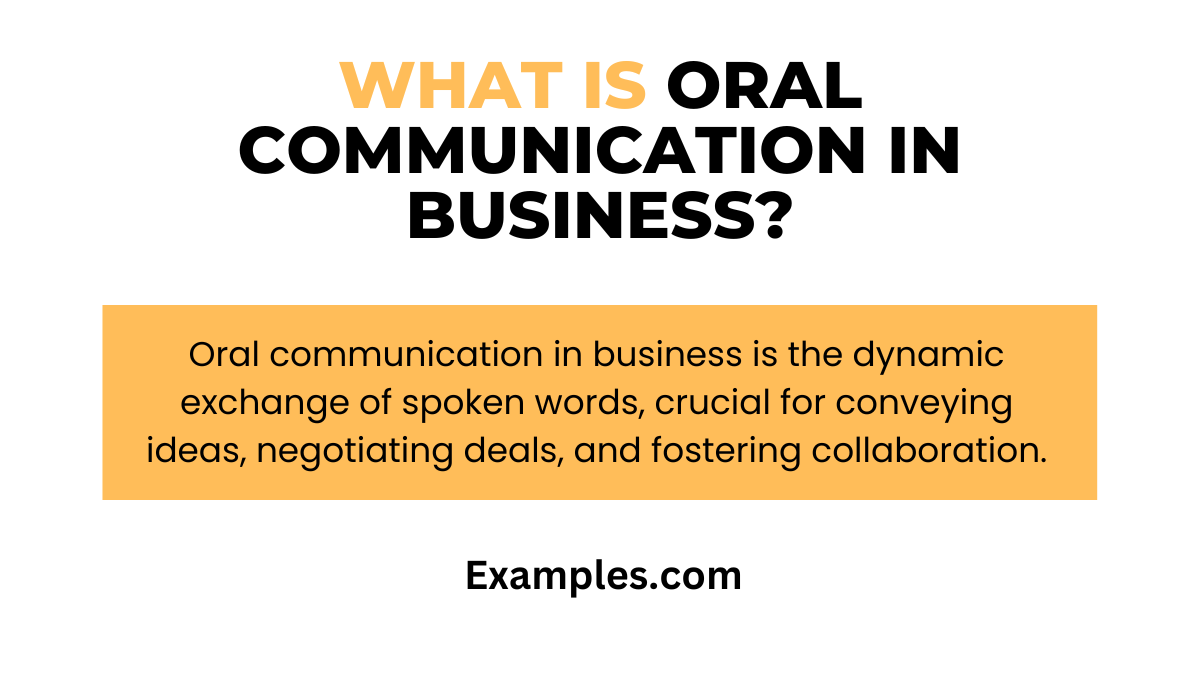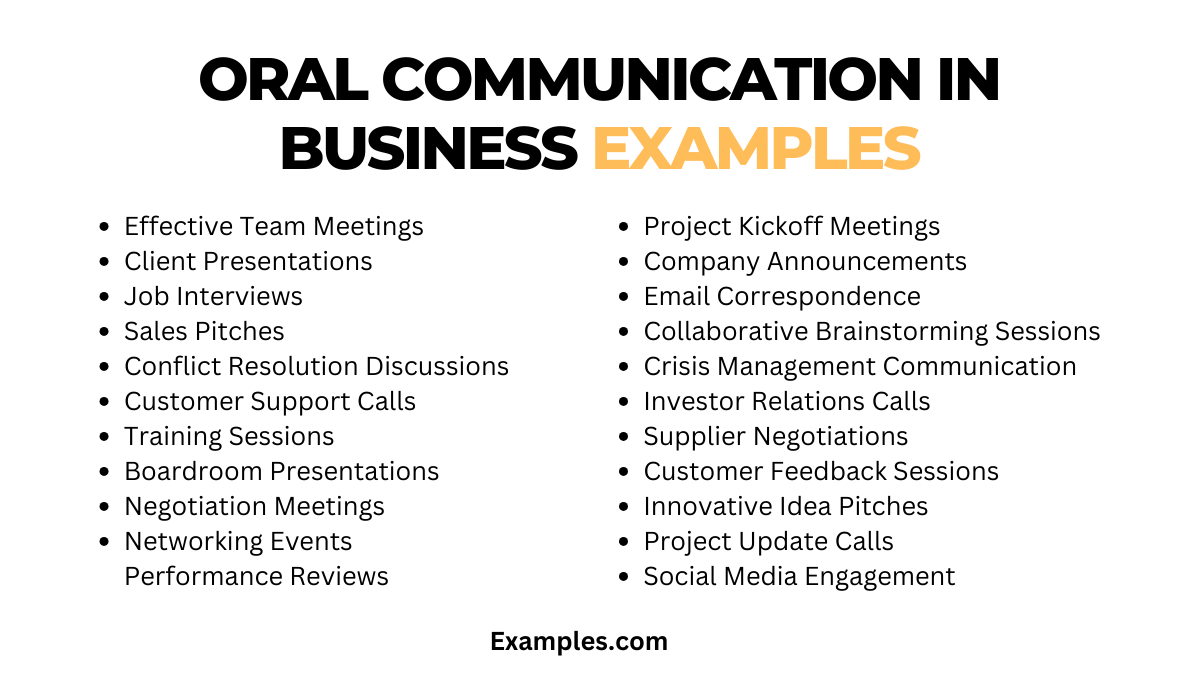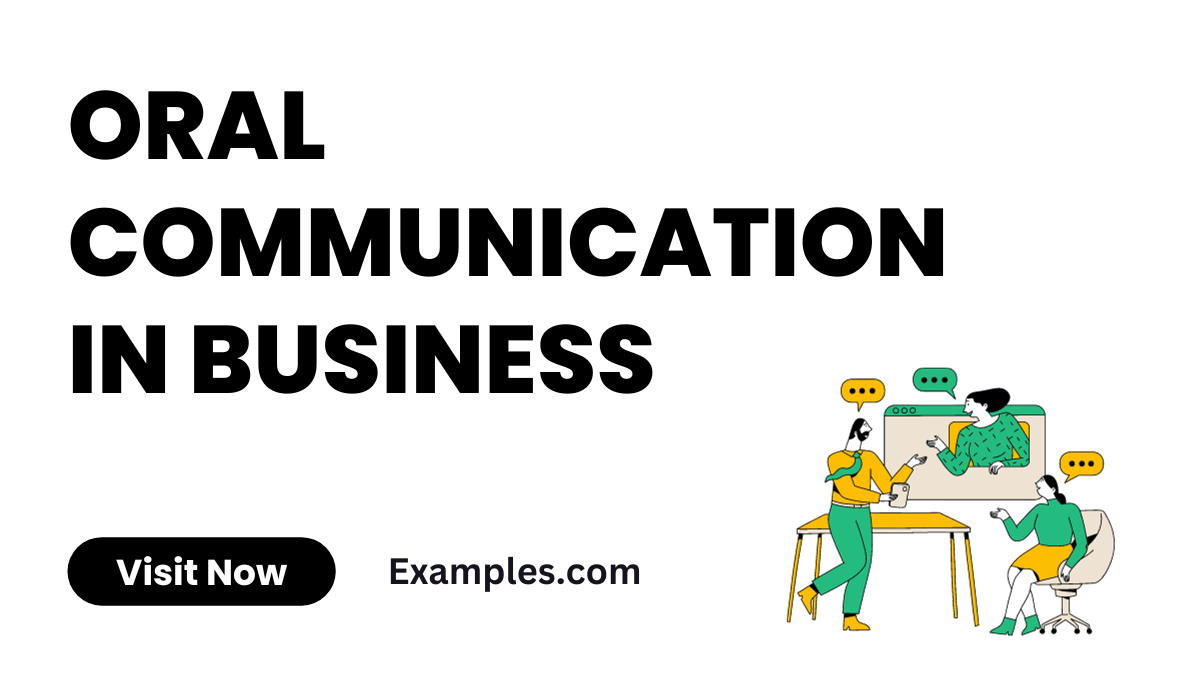10+ Oral Communication in Business Examples
Unlock the power of effective communication in business with our comprehensive guide to Oral Communication. In this guide, discover a wealth of insights, strategies, and real-world Communication Examples to enhance your professional interactions. Learn the art of conveying ideas seamlessly, fostering collaboration, and achieving success in various business scenarios. Elevate your oral communication skills, from interviews and workplace interactions to real-life applications and student perspectives, ensuring you excel in the dynamic landscape of business communication.
What is Oral Communication in Business?

Oral Communication in business refers to the dynamic exchange of information, ideas, and messages through spoken words within the professional environment. This multifaceted communication approach encompasses face-to-face conversations, meetings, presentations, and other verbal interactions crucial for effective business operations.
In this context, oral communication serves as a vital pillar for conveying complex concepts, negotiating deals, and fostering collaborative efforts. Its significance lies in facilitating quick decision-making, ensuring clarity in instructions, and building strong interpersonal relationships among team members and stakeholders.
What is the Best Example of Oral Communication in Business?

A compelling example of oral communication in business is the pivotal role it plays in a high-stakes negotiation meeting. In this scenario, effective communication is exemplified through clear articulation, active listening, and strategic persuasion. The exchange of ideas and information during negotiations requires finesse in verbal expression to influence decisions, resolve conflicts, and ultimately achieve mutually beneficial outcomes.
30 Oral Communication in Business Examples

Incorporating these oral communication examples into business practices enhances collaboration, decision-making, and overall success within the professional landscape.
- Effective Team Meetings: Conducting structured team meetings fosters open communication, ensuring everyone is informed and aligned with project goals. For instance, a weekly status update meeting enhances coordination among team members.
- Client Presentations: Delivering compelling client presentations showcases persuasive oral communication skills. Crafting a clear narrative and addressing client concerns contribute to successful negotiations and project approvals.
- Job Interviews: Interviewing candidates requires precise oral communication to assess qualifications and convey company values. Asking relevant questions and providing feedback ensures a thorough evaluation process.
- Sales Pitches: Engaging sales pitches involve tailoring messages to customer needs. A persuasive pitch, such as highlighting product benefits, enhances communication and increases sales potential.
- Conflict Resolution Discussions: Resolving workplace conflicts demands effective oral communication. Addressing concerns, active listening, and proposing solutions contribute to a harmonious work environment.
- Customer Support Calls: Handling customer support calls requires clear communication to address inquiries and provide solutions. Empathy and clarity in explanations enhance customer satisfaction.
- Training Sessions: Conducting employee training sessions involves clear oral communication to impart knowledge effectively. Providing examples and encouraging questions ensures understanding.
- Boardroom Presentations: Delivering impactful boardroom presentations demands articulate communication. Well-structured content, visual aids, and confident delivery contribute to effective communication.
- Negotiation Meetings: Negotiating business deals involves strategic oral communication. Clear articulation, persuasive techniques, and compromise contribute to successful negotiations.
- Networking Events: Networking events require effective communication to build professional relationships. Initiating conversations, exchanging business cards, and expressing ideas succinctly contribute to networking success.
- Performance Reviews: Conducting employee performance reviews involves providing constructive feedback. Clear communication regarding strengths, areas for improvement, and goal setting ensures employee development.
- Project Kickoff Meetings: Initiating projects through kickoff meetings requires clear communication of objectives and expectations. Addressing questions and fostering collaboration sets the project tone.
- Company Announcements: Communicating company announcements involves clarity and transparency. Clearly articulating changes, achievements, or challenges maintains employee morale and trust.
- Email Correspondence: Written communication, such as email, is crucial in business. Crafting concise, clear, and professional emails ensures effective communication and avoids misunderstandings.
- Collaborative Brainstorming Sessions: Collaborative brainstorming sessions require effective oral communication to encourage idea sharing. Creating an open environment and valuing diverse opinions contribute to innovation.
- Crisis Management Communication: Addressing crises demands clear oral communication. Keeping stakeholders informed, acknowledging challenges, and presenting solutions maintain trust and credibility.
- Cross-Departmental Meetings: Facilitating meetings across departments requires effective communication to ensure alignment. Clearly communicating objectives and fostering collaboration enhance cross-functional teamwork.
- Investor Relations Calls: Communicating with investors demands transparency and confidence. Providing updates, addressing concerns, and presenting future strategies contribute to positive investor relations.
- Supplier Negotiations: Negotiating with suppliers involves effective oral communication. Clearly expressing expectations, discussing terms, and finding common ground contribute to successful partnerships.
- Customer Feedback Sessions: Collecting customer feedback requires active listening and clear communication. Acknowledging concerns, expressing gratitude, and proposing improvements demonstrate customer-centric communication.
- Innovative Idea Pitches: Presenting innovative ideas demands persuasive oral communication. Clearly articulating benefits, addressing potential challenges, and inspiring enthusiasm contribute to idea acceptance.
- Strategic Planning Meetings: Participating in strategic planning meetings involves contributing ideas. Clearly expressing thoughts, proposing solutions, and engaging in discussions contribute to effective planning.
- Project Update Calls: Providing project updates requires concise communication. Presenting achievements, addressing challenges, and outlining future plans maintain transparency and accountability.
- Social Media Engagement: Engaging on social media platforms demands effective oral communication. Responding to comments, participating in discussions, and conveying brand messages enhance online presence.
- Leadership Speeches: Delivering leadership speeches requires inspirational communication. Expressing a vision, motivating teams, and addressing challenges contribute to effective leadership communication.
- Employee Onboarding Sessions: Conducting employee onboarding sessions involves clear communication of company values and expectations. Providing guidance, answering questions, and fostering a welcoming environment enhance the onboarding process.
- Feedback Collection Meetings: Gathering feedback from employees involves effective communication. Creating a comfortable environment, asking targeted questions, and ensuring anonymity contribute to honest feedback.
- Market Research Interviews: Conducting market research interviews requires skilled oral communication. Asking unbiased questions, actively listening to responses, and adapting based on feedback contribute to accurate data collection.
- Training Workshops: Hosting training workshops involves clear communication of concepts. Providing hands-on examples, encouraging participation, and addressing queries enhance the learning experience.
- Product Launch Events: Launching products requires effective communication to excite the audience. Presenting features, benefits, and addressing inquiries contribute to a successful product launch.
Oral Communication in Business for Real Life
Navigating real-life business scenarios requires adept oral communication skills. Effective communication fosters collaboration, resolves conflicts, and strengthens professional relationships. Here are 10 real-life examples:
- Client Meetings: Articulate your offerings clearly to address client needs.
- Networking Events: Introduce yourself concisely to make a lasting impression.
- Project Updates: Communicate progress transparently during team meetings.
- Conflict Resolution: Address disputes promptly, seeking resolution through open dialogue.
- Negotiations: Skillfully negotiate terms to achieve mutually beneficial agreements.
- Performance Reviews: Conduct constructive performance reviews for employee development.
- Public Speaking: Present ideas confidently in conferences or seminars.
- Crisis Management: Communicate effectively during crises, providing assurance and solutions.
- Employee Onboarding: Welcome new hires, outlining company culture and expectations.
- Business Pitches: Present business proposals persuasively to secure partnerships.
Oral Communication in Business for Students
For students entering the business world, honing oral communication skills is essential. Here are 10 practical examples for success:
- Class Presentations: Deliver well-prepared presentations to showcase knowledge.
- Internship Interviews: Articulate experiences and aspirations during internship interviews.
- Group Projects: Collaborate effectively, ensuring clear communication within the team.
- Mock Interviews: Practice interview skills to boost confidence and clarity.
- Networking with Professionals: Engage with industry professionals to build valuable connections.
- Resume Reviews: Clearly communicate skills and achievements on resumes.
- Email Correspondence: Craft professional emails with clear and concise language.
- Job Fairs: Introduce yourself confidently, highlighting academic and extracurricular achievements.
- Industry Workshops: Participate actively, asking relevant questions and expressing opinions.
- Case Study Presentations: Convey critical analysis and solutions in case study presentations.
Oral Communication in Business for Interview
Effective oral communication is crucial during interviews, showcasing your suitability for the role. Master the art with these key points:
- Clear Introduction: Begin with a confident self-introduction, emphasizing relevant skills.
- Active Listening: Pay attention to the interviewer’s questions, demonstrating engagement.
- Structured Responses: Provide well-organized answers, addressing key aspects of each question.
- Tailored Examples: Support your responses with specific examples from your experience.
- Clarity in Expression: Speak clearly and concisely, avoiding unnecessary jargon or complex language.
- Positive Body Language: Maintain eye contact, sit upright, and use gestures subtly to convey confidence.
- Adaptability: Adjust your communication style to align with the company culture and interviewer’s demeanor.
- Question Clarification: If unsure about a question, seek clarification to provide accurate responses.
- Engage in Dialogue: Turn the interview into a conversation, showcasing your interpersonal skills.
- Closing Statement: Conclude with a brief, impactful summary of your suitability for the role.
Oral Communication in Business for Workplace
Effective oral communication is fundamental in the workplace for seamless collaboration. Elevate your skills with these essential points:
- Clear Articulation: Express ideas clearly, ensuring colleagues grasp your messages accurately.
- Meeting Etiquette: Contribute meaningfully in meetings by offering insights and actively participating.
- Conflict Resolution: Navigate conflicts by addressing issues calmly and proposing constructive solutions.
- Effective Briefings: Deliver concise and informative briefings, ensuring teams are well-informed.
- Presentation Skills: Polish your presentation skills to convey information persuasively and engagingly.
- Feedback Reception: Accept feedback gracefully, showing a willingness to learn and improve.
- Collaborative Discussions: Encourage open discussions, valuing diverse opinions and fostering teamwork.
- Empathy in Communication: Understand colleagues’ perspectives, promoting empathy and understanding.
- Timely Updates: Communicate project updates promptly, maintaining transparency and accountability.
- Crisis Communication: Handle crises with clear communication, keeping teams informed and reassured.
Mastering these oral communication aspects in both interviews and the workplace is essential for professional success and effective collaboration.
Why is Oral Presentation Important in Business Communication?
Oral presentations play a pivotal role in business communication for several reasons:
- Clarity of Message: Oral presentations offer a clear and direct way to convey complex information, ensuring understanding among diverse audiences.
- Engagement and Persuasion: Speaking directly to an audience allows for engagement, enabling presenters to persuade and influence opinions effectively.
- Immediate Feedback: Presenters receive immediate feedback through verbal and non-verbal cues, facilitating quick adjustments for better communication.
- Showcasing Expertise: A well-delivered oral presentation showcases the presenter’s expertise, establishing credibility in the business context.
- Human Connection: Oral communication fosters a human connection, helping build relationships and trust, which are vital in business interactions.
How Does Oral Communication Help in Business?
Oral communication is a cornerstone in business, providing numerous benefits:
- Effective Team Collaboration: Oral communication facilitates seamless collaboration among team members, enhancing efficiency and productivity.
- Client Interaction: Direct communication with clients builds relationships, fosters understanding, and ensures client satisfaction.
- Conflict Resolution: The spoken word is instrumental in resolving conflicts by allowing for open dialogue and clarification of misunderstandings.
- Leadership Communication: Leaders use oral communication to articulate visions, goals, and strategies, inspiring and guiding their teams.
- Negotiation Skills: Oral communication is crucial in negotiations, enabling negotiators to express their positions, understand others, and reach mutually beneficial agreements.
How to Create an Oral Communication in Business?
Creating effective oral communication in business involves a strategic approach. Follow these steps:
- Define Objectives: Clearly outline the purpose and objectives of your communication.
- Know Your Audience: Understand your audience’s preferences, knowledge, and expectations.
- Choose Appropriate Channels: Select the most suitable communication channels for your message.
- Craft Clear Messages: Express ideas concisely, avoiding ambiguity and unnecessary complexity.
- Use Visual Aids: Enhance your message with visuals to aid understanding and retention.
Tips for Effective Oral Communication in Business?
Mastering oral communication is vital for business success. Consider these tips:
- Active Listening: Pay close attention to others, demonstrating genuine interest in their perspectives.
- Clarity in Expression: Communicate clearly, avoiding jargon and ensuring your message is easily understood.
- Body Language Awareness: Be mindful of your body language, as it conveys additional meaning.
- Adaptability: Adjust your communication style to suit the context and the preferences of your audience.
- Confidence: Project confidence in your voice and demeanor to inspire trust and credibility.
The guide on “Oral Communication in Business” on Examples.com concludes by emphasizing the importance of mastering oral communication skills for business success. It highlights that effective communication is crucial for fostering collaboration, understanding, and success in the professional world. The guide provides comprehensive tools and tips for professionals to enhance their communication skills, ensuring impactful and effective interactions in various business scenarios??.
To further expand your understanding and skills in oral communication within a business context, consider exploring additional resources from credible institutions and organizations. These resources often offer in-depth insights, case studies, and practical advice that can be instrumental in honing your communication abilities:
- Harvard Business Review (HBR): Renowned for its insightful articles on business and management, HBR offers a plethora of resources on effective communication in the workplace. Their website (https://hbr.org contains articles, podcasts, and webinars that provide valuable perspectives on how to communicate effectively in various business situations.
- Toastmasters International: A leader in communication and leadership development, Toastmasters International provides resources and training programs that can significantly enhance your oral communication skills. Their website (https://www.toastmasters.org offers access to local clubs, educational materials, and public speaking tips that are invaluable for business professionals.
By leveraging these resources, you can deepen your understanding of oral communication in business and develop skills that are essential for professional growth and effective workplace interactions.



